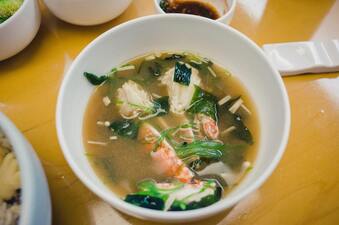|
|
 The ocean contains rich sources of many nourishing substances that are high in essential minerals, the 43 trace minerals, chlorophyll, iodine, protein, essential fatty acids, vitamins and much more. Iodine is essential for the thyroid gland. It stimulates the parathyroid glands making it easier to absorb the calcium in the seaweed needed to nourish bones and leg joints. This is one reason kelp is good for arthritis sufferers. The darker sea vegetables contain alginic acid which converts heavy metals in the body into harmless salts that are easily discharged. Kombo, wakame, hijiki and kelp are the dark sea vegetables. Research at McGill University, Canada has found that the dark sea vegetables can even remove radioactive Strontium-90 from the body. Medical doctors in Nagasaki, Japan, in attempting to treat radiation-poisoned victims, following the dropping of the atomic bomb in 1945, saved many of their patients by administering a diet of miso soup, brown rice, and sea vegetables. The Canadian Medical Association Journal also reported the importance of different marine algae in preventing absorption of radioactive products, as well as in their use as possible natural de-contaminators. Kelp comes in tablet, powdered and liquid forms and it is recommended for arthritis and thyroid malfunction, and is good in aiding in protection from chemotherapy, radiation, and x-rays. Seaweed contains calcium phosphate making it good for brittle bones common in osteoporosis. The calcium, iodine, and sodium alginate in seaweed also serve as buffers against cancer. Seaweed may also be an important factor in the low rates of certain cancers in Japan. In 1974, the Japanese Journal of Experimental Medicine reported scientists had found several varieties of kombu that were effective in the treatment of tumours. Ten years later, a Harvard University Medical Centre researcher reported that eating a diet of 5% kombu, significantly delayed the inducement of breast cancer in animals. Other experiments on mice with leukaemia, in which sea vegetables were used in the treatment regimen, showed great promise. The high content of potassium in seaweed is good for the heart, kidneys, and in weight loss. The iodine needed by the thyroid glands aid in weight loss also. Seaweed nourishes membranes making it good for nervous disorders, colds, constipation, and skin disorders. The edible seaweed, dulse, is one of the most nutritious, and is harvested off the shores of Nova Scotia and California. All 43 trace minerals are found in dulse. Dulse is good to use in soups, stews, casseroles and any dish you are preparing. My personal favourites are wakame, which is a long, dark green sea leaf. It can be added to salads, soups and pulse dishes. Another favourite is Nori, which comes in sheets and is toasted. You can use it to garnish noodles, rice, vegetables, make sushi rolls and so on. I use it as a wrap and fill it with avocado and salad. Nori is said to be good for prostate and thyroid problems. It is high in protein, vitamins B1, B2, B6, B12, and vitamins C and E. To sum up, incorporating seaweed into your diet, even in modest quantities, is a wise choice. Seaweed stands as a natural mineral-rich resource. You can begin by introducing it gradually into various dishes, such as soups. Personally, I relish miso soup paired with red rice or quinoa, a delightful combination worth trying. Barbara's Mouchendra / Lentil Dish with wakame
0 Comments
Leave a Reply. |
AuthorBarbara is a qualified nutritionist offering Health, Nutrition & Lifestyle Counseling. She gives Healthy weight loss advice and promotes the Mediterranean diet. She is the author of the Med Life Diet - creating healthy lifestyle habits and attitudes for life ! Archives
April 2024
|
 RSS Feed
RSS Feed
